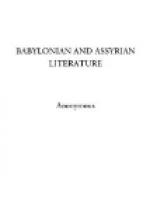49 He has granted me in his august power, a happy
existence,
long life, and I obtained
a constantly lucky reign.
I have entrusted myself to
his favor.
50 The great Lord Bel-El, the Master of the lands,
inhabits
the lofty tracts; the gods
and Istarat inhabit Assyria;
their legions remain there
in pargiti, and martakni.
51 With the Chiefs of provinces, the Satraps, wise
men,
Astronomers, Magnates, the
Lieutenants and Governors
of Assyria, I have ruled in
my palace, and administered
justice.
52 I have bid them take gold, silver, gold and silver
vessels,
precious stones, copper, iron,
considerable products of
mountains the mines of which
are rich, cloth of berom and
cotton, blue and purple cloth,
amber, skins of sea-calves,
pearls, sandal-wood, ebony,
horses from higher Egypt,[51]
asses, mules, camels, oxen.
With all these numerous
tributes I have rejoiced the
heart of the gods.
53 May Assur, the father of the gods, bless these
palaces, by
giving to his images a spontaneous
splendor. May he
watch over the issue even
to the remote future. May the
sculptured bull, the protector
and god who imparts perfection,
dwell in day and in night-time
in his presence, and
never stir from this threshold!
54 With the help of Assur, may the King who has built
these
palaces, attain an old age,
and may his offspring multiply
greatly! May these battlements
last to the most remote
future! May he who dwells
there come forth surrounded
with the greatest splendor;
may he rejoice in his corporal
health, in the satisfaction
of his heart accomplish his
wishes, attain his end, and
may he render his magnificence
seven times more imposing!
[Footnote 1: Orchoe, the Erech of the Bible, is certainly the Warka of the present day; Sippara, Sofeira; Nipur, Niffar; Larsam, Senkereh. Ur (the Ur of the Bible) is Mugheir; Kullab and Erikhi are unknown. (See “Exped. en Mesopot.,” i. p. 255 et seq.)]
[Footnote 2: The old empire Bal-bat-ki. The syllabaries explain this ideogram by “Assur,” but it is very awkward that in these texts the identification with Assur occurs nowhere. I therefore transcribe “Sumer,” which was the true name of the people and the language named wrongly Accadian. The term of “Sumerian” is supported by MM. Menant, Eneberg, Gelzer, Praetorius, Delitzsch, Olshausen, and other scholars.]
[Footnote 3: “Itanus,” or Yatnan, in the island of Crete, became afterward the name of the island of Cyprus.]
[Footnote 4: For the words in italics no satisfactory translation has as yet been found.]
[Footnote 5: The “Pekod” of the Bible (Jer. i. 21; Ezek. xxiii. 23).]
[Footnote 6: Which belongs to Elam.]




